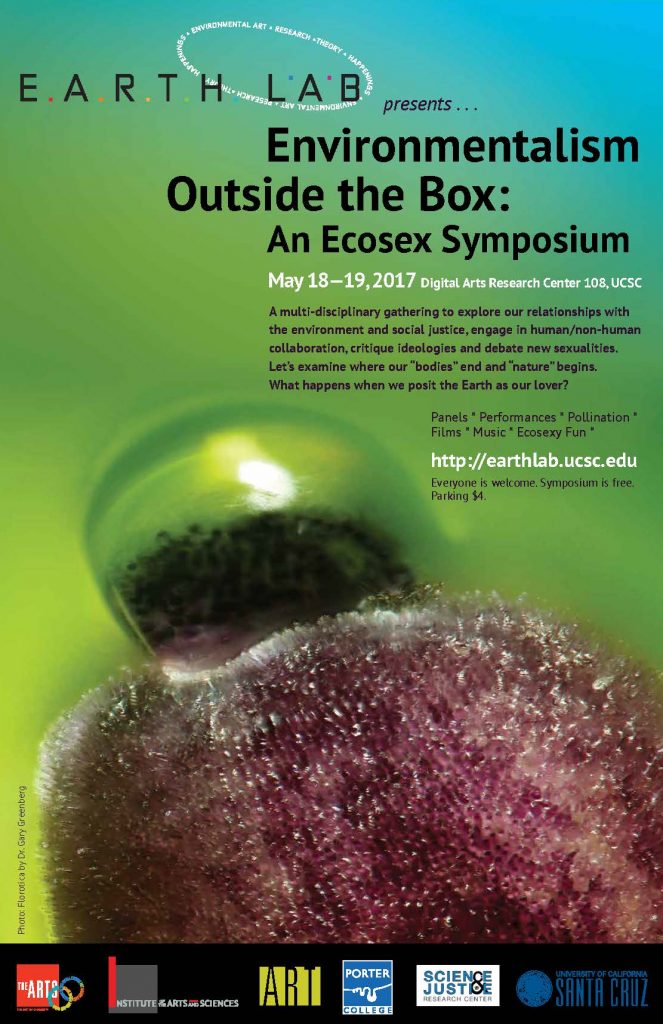Speculative Fiction Workshop with Joan Haran and Martha Kenney
With interventions from Starhawk, Donna Haraway, and Elizabeth Stephens
Wednesday, October 18, 2017
1:00-4:30 PM
DARC Light Lab 306
In this workshop we will take inspiration from Starhawk and Donna Haraway. In their writings since the later 1970s we can trace both the influence of a web of feminist SFs, including speculative fiction, science fiction and speculative fabulation, and their own crafting of SF. They are both authors of feminist SF; most explicitly with Starhawk’s The Fifth Sacred Thing (1993) and its sequel City of Refuge (2015) and Haraway’s “The Camille Stories” (2016) but also implicitly in their work on movement-building and figuration. They use SF not to conjure purified alternatives or forms of escape, but to remain embedded in and accountable to the world. The workshop will focus on this mode of SF and their insistence on accounting for compromised and difficult relationality, shared responsibility and non-innocence.
For this workshop, we invite feminist, queer, antiracist, and decolonial STS scholars or activists working on environmental and racial justice to experiment with the possibilities of speculative and visionary storytelling. All participants will submit a short piece of work (by October 2nd) which will be circulated to other workshop participants for reading ahead of the workshop. If you’ve never done creative writing before, do not worry! We are looking for messy and promising provocations, not polished manuscripts. You are asked to submit 900 words of speculative fiction about a place that is particularly meaningful to you. You might conjure up its future, produce a speculative and disruptive history or trace the contours of an alternate present. Who and what have (had) attachments to that place, and how are those attachments bound up in larger networks of interrelationship? Do those attachments open up ways of imagining flourishing cohabitation (however you conceive of that), or do those attachments need to be disconnected and / or reconnected to create spaces of possibility?
Read the full CFP and reserve your place by emailing jharan@uoregon.edu and cmasseng@ucsc.edu.
Reception
4:30 PM – 5:00 PM (Workshop Participants)
5:00 PM – 6:00 PM (open to public)
DARC Lab 108
Please join the Speculative Workshop participants for a reception before the public dialogue with Donna Haraway and Starhawk.
Magic, Figuration & Speculative Fiction as Calls to Action
Wednesday, October 18, 2017
6:00-8:00 PM
DARC Lab 108
Please register to attend as seating is limited.
Starhawk and Haraway will engage questions about their lifetimes of activism and writing in a conversation moderated by SJRC Visiting Scholar, Joan Haran. The dialogue will explore the convergences and divergences of their respective work in ecofeminism and feminist science studies. How do they each account for their participation in key social movements and what do they understand to be the most urgent work to be done in our current moment? Dr Haran will invite Starhawk and Haraway to reflect on the ways in which they have addressed their readers and students to engage and empower them. How do they address the challenge of communicating and working across generations? She will ask about their innovative and creative rhetorical strategies, and about the ways in which they are both motivated by speculative fictions and use them to motivate others. She will ask them to reflect on the ethical and political commitments that they have in common; the conditions of possibility afforded by living and working from Northern California in the late 20th and early 21st century; and the specific practices they undertake and relationships they nurture to balance their critical concerns with joy and pleasure in Technoscience and everyday life.
Joan Haran is a Marie Skłodowska-Curie Global Fellow at the Center for the Study of Women in Society, University of Oregon and the School of Journalism, Media and Cultural Studies, Cardiff University. In her current research she is developing several case studies to test out the concept Imaginactivism:the entanglement of fictional cultural production and social justice activism. Her book, Genomic Fictions: Genes, Gender and Genre is forthcoming from the University of Wales Press.
Donna J. Haraway is Distinguished Professor Emerita in History of Consciousness and Feminist Studies, UC Santa Cruz. In her latest book Staying With the Trouble she extends her longstanding engagement with SFs – science fiction, speculative fiction, string figures , for example – into her own experiments with speculative fabulation. She writes: “The Children of Compost insist that we need to write stories and live lives for flourishing and for abundance, especially in the teeth of rampaging destruction and impoverization.”
Martha Kenney (Assistant Professor, Women and Gender Studies, San Francisco State University) is a feminist science studies scholar whose research explores the poetics and politics of ecological storytelling. Alongside her main research project on the narratives emerging from environmental epigenetics, she is working on a collaborative work of climate fiction (cli-fi) that considers what kinds of labor, sociality and happiness might sustain us in a world increasingly devastated by the violence of capitalist production, consumption, and waste. She has lead creative writing workshops for Science and Technology Studies scholars at UC Santa Cruz, Berkeley, and San Francisco State University.
Starhawk is an author, activist and teacher, famous for her ecofiction The Fifth Sacred Thing as well as many works of non-fiction. She is co-founder of Earth Activist Trainings, teaching permaculture design grounded in spirit and with a focus on organizing and activism. Since May of 2001, Earth Activist Trainings has graduated over 1000 students who now shepherd projects that range from community power-down strategies in Iowa City to water catchment programs in Bolivia, from inner city gardens in San Francisco to programs in the West Bank of Palestine.
Elizabeth Stephens is a performance artist, filmmaker, activist and educator. Her work explores themes of queerness, feminism and environmentalism. She is the founding director of the E.A.R.T.H. Lab which explores environmental art, research, theory and happenings. Her most recent feature film, co-directed with life partner and collaborator Annie Sprinkle, is Water Makes Us Wet. Stephens has exhibited visual art, created performance art pieces and screened films nationally and internationally for over 35 years. Most recently she and Sprinkle participated in Documenta 14.
Workshop and Dialogue co-sponsored by: Science and Justice Research Center, Center for Agroecology and Sustainable Food Systems, Center for Creative Ecologies, Departments of Feminist Studies, History of Consciousness, Philosophy, Sociology, Division of Art, E.A.R.T.H. Lab and OpenLab.
Imaginactivism Critical Listening Imaginactivism report by Chessa Adsit-Morris


